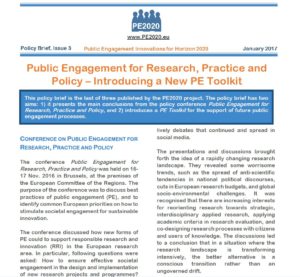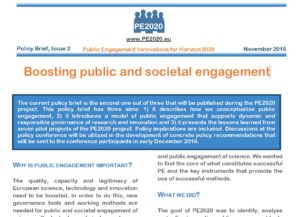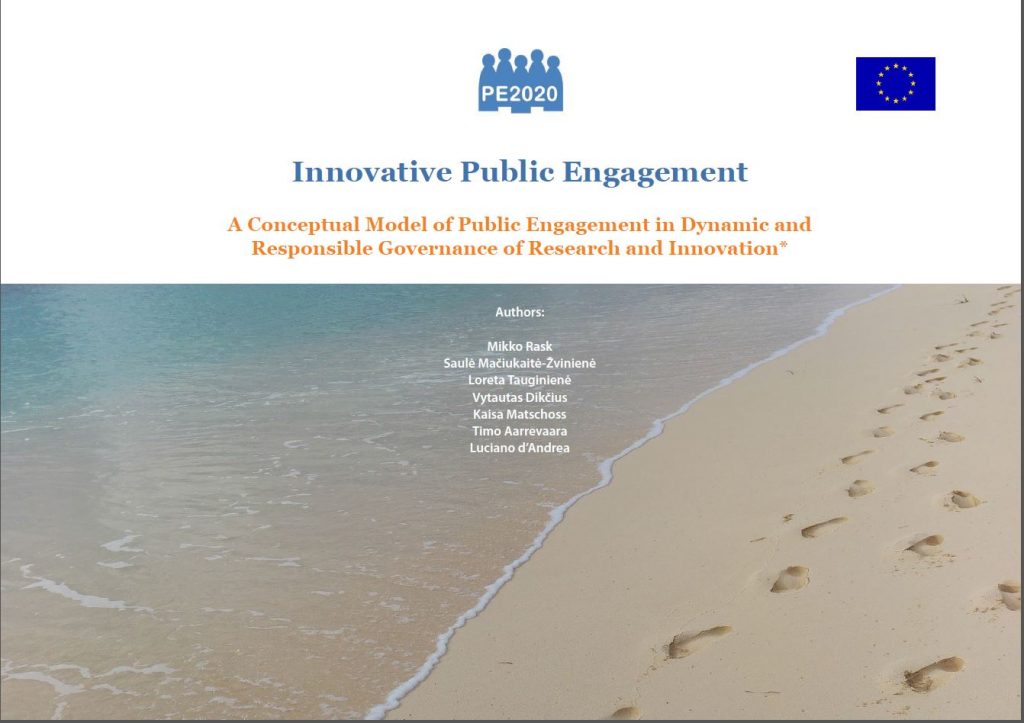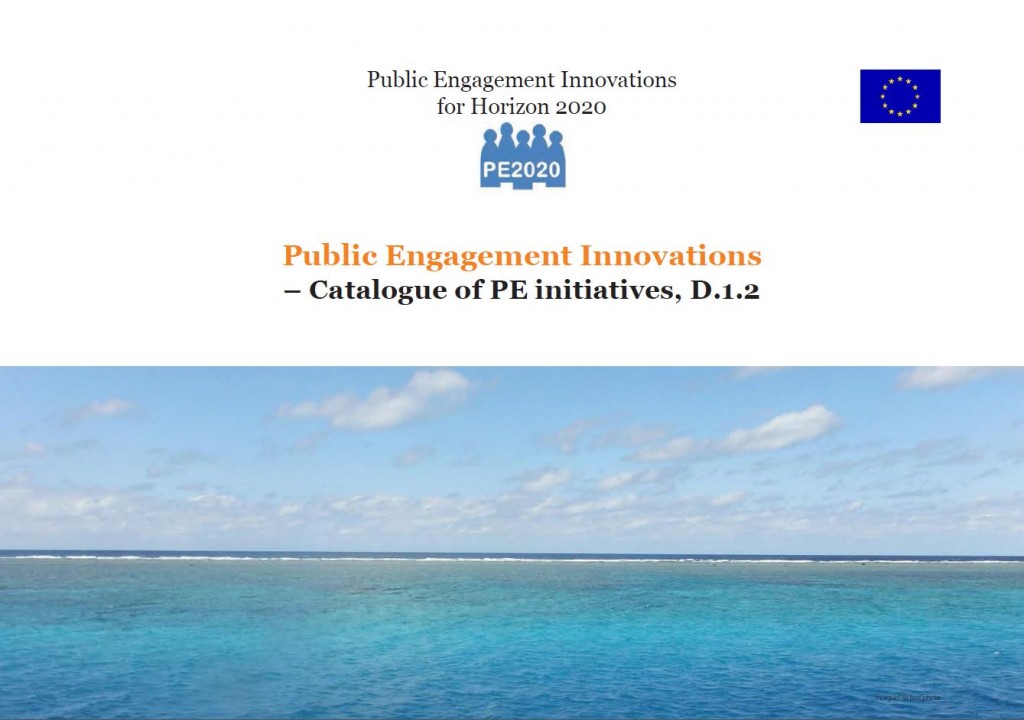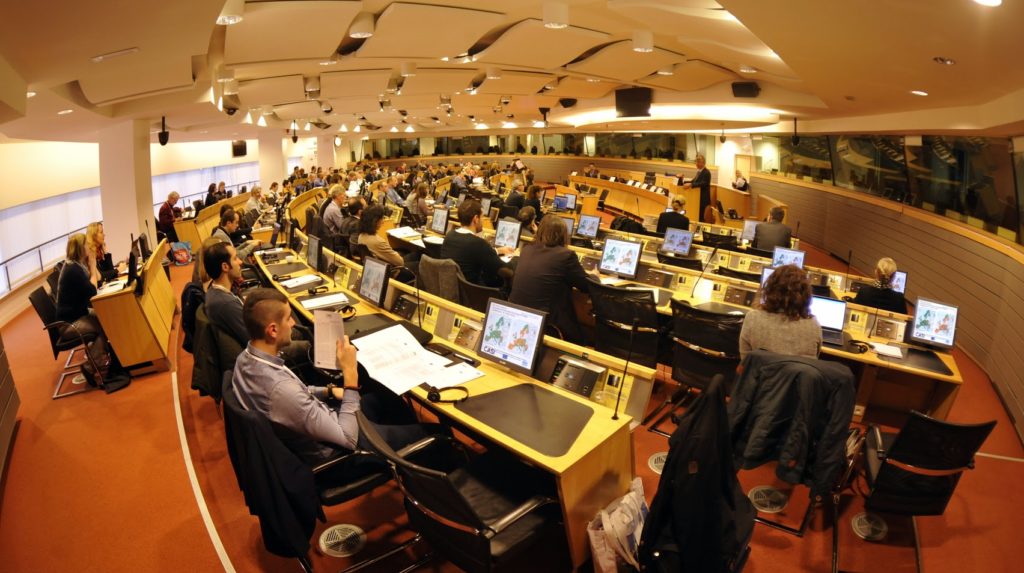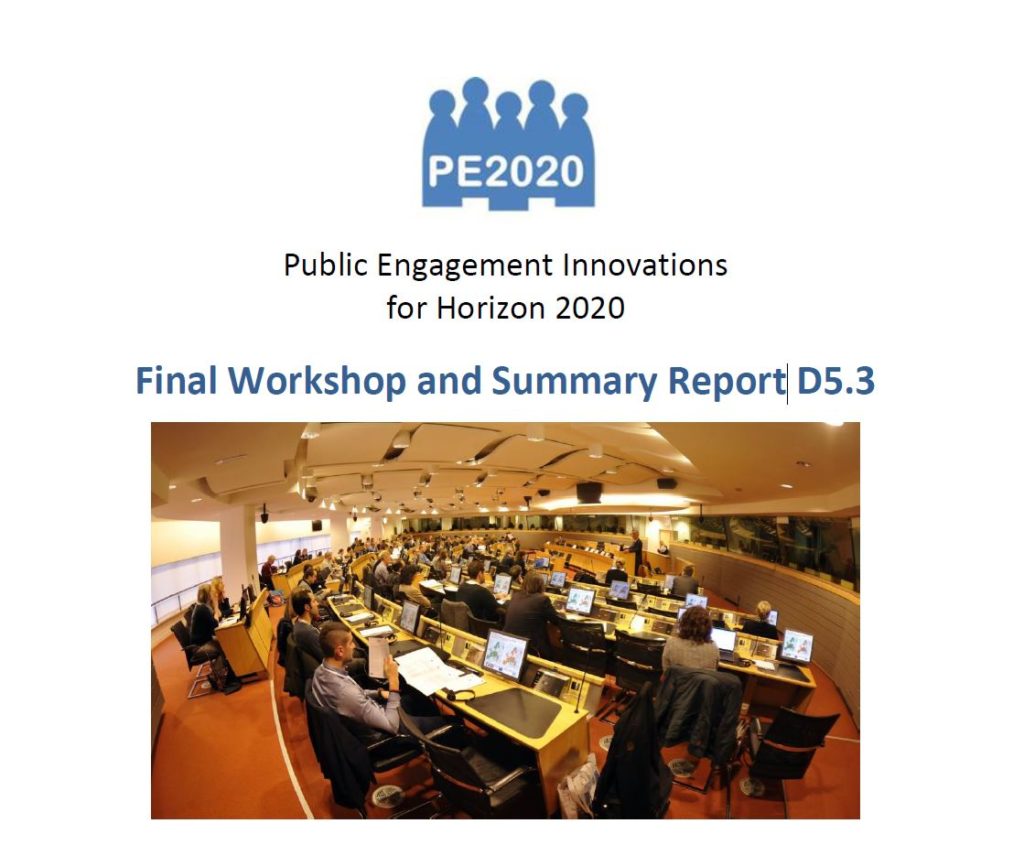The objective of the PE2020 consortium is to create new knowledge of the status quo and trends in the field of public engagement in science. This page presents the outputs of the project.
Evaluation
The PE2020 project has assigned as an external evaluator Göran Melin and his team from the Technopolis group to evaluate the project and its advancement for the internal use of the project. The purpose was to gain guidance for the project in order to reach as good results as possible. As the project has aimed for transparency throughout its activities, we publish the external evaluation report for all interested as it might also help support other PE projects in their work.
Policy briefs
Please find here our third policy brief about the results of Public Engagement for Research, Practice and Policy -conference and the introduction to a new PE2020 toolkit!
Please find here our second policy brief about boosting public and societal engagement!
Please find the first policy brief in English or in Italian published in the PE2020-project that aims at shortly giving the overview and the direction of the project so far!
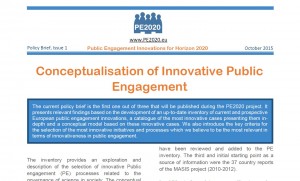
Reports from WP4
One of the main outputs expected from the PE2020 project is the development of a web-based toolkit that helps policy makers to adopt, adjust and implement PE processes for their different needs. You can find here a Toolkit design document designed by the PE2020-project.
Here you can find the deliverable D4.2, which is a report of the webtool PE2020 toolkit.
The summary of the work undertaken in work package 4 can be found here.
Reports from WP3
Please find here the Summary Report of WP3.
This Report of the PE pilot cases on Societal Challenges Deliverable 3.2 presents the work executed in PE2020 Work Package Three. The aim of the work package was to 1) test and refine innovative public engagement tools and processes in research programme contexts, 2) to evaluate the feasibility of using such tools in other countries, and 3) to gain further understanding of the relevance of contextual factors in designing processes for public engagement.
The seven pilot initiatives were co-designed and implemented with the research projects and programmes we examined. Testing and introducing new public engagement processes requires them to be adapted to the preconditions of the target programmes. Through the pilot initiatives we were also able to identify innovative public engagement methods. The initiatives led to positive results with regard to the quality of the research projects as well as the relationships between the actors. The forms of public engagement used in the pilot initiatives varied from more conventional science communication and focus group discussions, to highly collaborative co-creation practices.
There has been strong pressure to find solutions that match the style and obligations of the new funding programmes. However, the successful research consortia from the first phases of adopting innovative practices have shown ability to develop both their knowledge and skills in public engagement.
The PE2020 project has organized a context tailoring workshop to consider the factors that precondition successful design and implementation of PE tools and instruments in local contexts. Please find a Report of the context tailoring workshop D3.1 organised in Italy and Finland in spring and summer 2015.
The pilot projects in Finland at a glance
The Joint Programming Initiative (JPI) More Years, Better Lives (MYBL) was chosen as a pilot initiative for the PE2020 project in order to pilot the idea of societal impacts and stakeholder involvement in the research grants awarded by the JPI MYBL programming initiative on European and global demographic change. Joint programming is a new approach to increase collaboration and coordination in research and development in Europe. The JPI MYBL programming initiative is focussed on demographic change which is one of the determining megatrends all over the world and is having an exceptional impact on Europe, for example in rising life expectancy and falling birth rates, resulting in an ageing society which in turn creates strains on existing welfare systems (e.g. pensions, health care, the labour market, and education). The conceptual aim of the programming initiative is to explore and enhance the understanding of societal impacts and stakeholder involvement in studies on the science and the society. You can read more in the report of the pilot initiative.
In the pilot initiative about Societal Interaction Plans we have examined the 16 projects selected in the first call of the Strategic Research Council (SRC) at the Academy of Finland. These projects commenced in late 2015 and will run for a maximum period of five and a half years. The competition for SRC funds was fierce and the application process was considered to be laborious. Hence, those responsible for the selected projects are aware that their progress will be followed closely and expectations are high for both scientific and societal deliverables. The SRC projects funded from the first call in 2015 fell under three main topics, each focusing on grand societal challenges: 1) utilisation of disruptive technologies and changing institutions (six projects), 2) a climate-neutral and resource-scarce society (four projects), 3) equality and its promotion (six projects). The Societal interaction plans report analyses public engagement tools, and identifies the partners and processes that define successful consortiums, the new knowledge on societal interaction plans (SIP) and benefits of SIPs for researchers and research groups. In addition to these core capacities of dynamic governance, continuity is viewed as an additional key capacity in the framework of this report.
Pilot on Promoting science-society dialogue with blogs among early-career researchers on Baltic Sea research with the Bonus-programme was chosen as a pilot initiative of the PE2020-project in order to deliberate on the possibilities to support junior-level researchers to engage with stakeholders and citizens in the different phases of research and innovation processes, to support the bottom-up initiatives of junior-level researchers in a traditionally hierarchic academic environment, and to deliberate on the possibilities for using new social media as a public engagement tool.
The Living Lab of Global Change Research -pilot was chosen as an initiative for the PE2020 project in order to deliberate on the possibilities to support and strengthen multi- and interdisciplinary, multi-actor research collaboration related to solving societal challenges, and to elaborate on the possibilities how intermediary organisations may strengthen inter- and multidisciplinary and multi-actor collaboration and support the continuity of living labs. It was realised together with Future Earth Finland.
The pilot projects in Italy at a glance
The pilot projects carried out in Italy presented in this website through three specific presentation sheets are certainly different from each other for what concerns the issues dealt with, the kind of players involved and the procedures adopted.
The first pilot, titled “Educating science-society relations and public engagement”, was held in Turin, in partnership with Agorà Scienza, an inter-university centre specialised in public engagement and science communication. The pilot was organised to test the possibility of using PE mechanisms to raise the awareness of and transferring knowledge to young students on the complex and changing relationships existing between science and society. The context was given by the 2015 edition of the Scientific Summer School (SSA), a week-long informal education initiative targeted at 50 high school students that Agorà Scienza organises each year. The strategy was that of mobilising the involved researchers (around 20 from different universities based in Turin) for incorporating public engagement in the SSA and for organising an experience of public engagement involving all students.
The second pilot, titled “Empowering young researchers on PE in energy efficiency “, was carried out in partnership with ENEA (Italian National Agency for New Technologies, Energy and Sustainable Economic Development) in the framework of the Summer School on Energy Efficiency that ENEA organised the last week of June 2015 targeting 25 young researchers (especially engineers). The pilot project was aimed at transferring knowledge and practices in PE for designing and implementing programmes on energy efficiency. To this end, besides the young researchers, the pilot involved also a group of ENEA project managers and the private companies concerned with the Summer School. The pilot included three main steps: a workshop with ENEA projects managers on PE in energy projects on the ENEA experience in public engagement to transfer to the students; the organisation of a training module on PE in the energy sector; the development of a handout on such an issue and its presentation in the final session of the Summer School.
The third pilot, titled “Dialogue Workshop on mobility and transportation“, was conducted in Naples in partnership with IDIS – Città della Scienza, in the framework of a 4-day initiative of public communication and debate on S&T. The rationale of the pilot was that of putting PE at the very centre of the debate on mobility and transportation in Naples, involving CSOs, research institutions, transportation utilities and local authorities in an open dialogue about the actual and potential role of participatory mechanisms in the mobility sector. The Dialogue Workshop was prepared through a process of consultation of some of the key stakeholders leading to the draft of a Discussion Outline, sent to all the participants in the workshop. After the event, a summary document containing the main results of the initiative was also drafted and sent to the participants.
Reports from WP2
The report Summary report on conceptual model of public engagement and factors of participatory performance D2.3 summarises the main results of WP2 of the PE2020 project. The general aim of WP2 is to refine the conceptual model that will
- inform and possibly reorient data collection in WP1
- provide conceptual categories that are relevant in identifying contextual factors related to the tailoring of best PE practices for WP3
- help to draw generalizable lessons of PE case studies to be used in the development of the PE design toolkit in WP4.
The summary is based on Deliverable 2.1 “A Refined Typology of PE Tools and Instruments” and Deliverable 2.2 “Innovative Public Engagement. A Conceptual Model of Public Engagement in Dynamic and Responsible Governance of Research and Innovation”.
The Deliverable D2.2 Innovative Public Engagement – A Conceptual Model of Public Engagement in Dynamic and Responsible Governance of Research and Innovation -study elaborates a conceptual framework of PE, where innovativeness, participatory performance and dynamic governance remain the key concerns. Our data are based on descriptions of 38 innovative PE cases, selected from a global sample of 256 cases that were identified in the data basis of the MASIS and Engage2020 projects, a systematic literature review, and our own qualitative survey.
The report Refined Typology of PE Tools and Instruments D2.1 counts on informing and possibly reorienting data collection that will help further to refine the conceptual model, notably the validation and enrichment of the relevant typologies of PE tools and instruments. Taking it in consideration, this report responds to contribute to a better understanding of ‘innovativeness’ of PE, i.e. novel participatory approaches can potentially help to develop better governance practices. To support empirical analysis of new PE tools and instruments, we therefore reviewed academic and grey literatures to analyse what constitutes innovativeness in this field. Thus, innovativeness of PE is defined as the novelty and potential impact in respect to Horizon2020 and encompassing such characteristics as ‘institutional hybridity’ (in order to reconcile or unify different systems and principles), ‘methodological novelty’ (referring to intensity and function of communication), ‘new ways of representation’ (how to make PE initiatives representative of larger population sectors), ‘potential impact’ (how to increase the potential impact of PE initiatives especially at the policy level) and ‘bearing on societal challenges’ (referring to what extent PE initiatives bear on relevant societal challenges). Criteria of innovativeness contribute both to the selection of the most promising PE process for further analysis and to the understanding of what are truly novel PE approaches that may have additional value for science governance.
Vilnius University International Business School has been responsible for the report but it was jointly produced by all consortium partners.
Please download the report from here: A typology of PE Tools.
You can download the Literature review on public engagement and participatory performance report here.
Reports from WP1
The aim of Work package 1 (WP1) of the PE2020 project has been to develop an up-to-date inventory of European public engagement innovations. The inventory has provided a background for the selection of innovative PE cases related to the governance of science in society, which have been further explored and described. These case explorations formed a catalogue of innovative PE activities in Europe and oversees, the Catalogue of PE Initiatives can be downloaded here. The PE2020 consortium gratefully thanks the organisers of these cases for providing us with valuable first-hand information on their activities!
The Summary report on European PE innovations presents the results of the work executed in WP1 of the PE2020. The results of WP1 will inform the conceptual refinements envisaged in WP2.
International workshop on innovative PE practices in Europe and beyond. The PE2020 project consortium organised an international workshop in context of the Public Communication of Science and Technology conference 2014 in Brazil in order to present the findings of the PE2020 project in collecting the catalogue of innovative PE practices. Please find the workshop report here: presentations at an international workshop.
Inventory of PE mechanisms and initiatives. As a first step PE2020 has identified and analysed innovative public engagement (PE) tools and instruments contributing to dynamic governance in the field of Science in Society. An updated inventory of current and prospective European PE innovations has been created in workpackage 1 as a joint effort of all consortium partners and lead by the Aarhus university.
The inventory will be updated as new PE innovations will emerge.
You can take a look at the inventory here: An inventory of PE cases.
Reports from WP5
Here you will find the report of the final policy conference held in Brussels, November 16-17, 2016.
You can find here the Deliverable D5.1 “Project web-pages”.
The Deliverable “Publications D5.2” can be downloaded here. It includes information on publications that were produced in the PE2020 project during its duration.
For a complete picture of the main findings and key messages we have provided a report “Final Workshop and Summary Report, D5.3” that describes the work executed in the PE2020 project and presents its main findings. You can download the summary report here.
The work package on dissemination and communication has produced annual dissemination plans, which can be found for 2014, 2015 and 2016 as well as an intensified dissemination plan for the PE2020 toolkit.
Results of WP6
You can download the final progress report D6.1 of the project here.
The final plan for using the knowledge D6.3 can be found here.
If you are interested, here are the Consortium, Steering Committee, and Advisory Panel Meetings Minutes D6.2.
